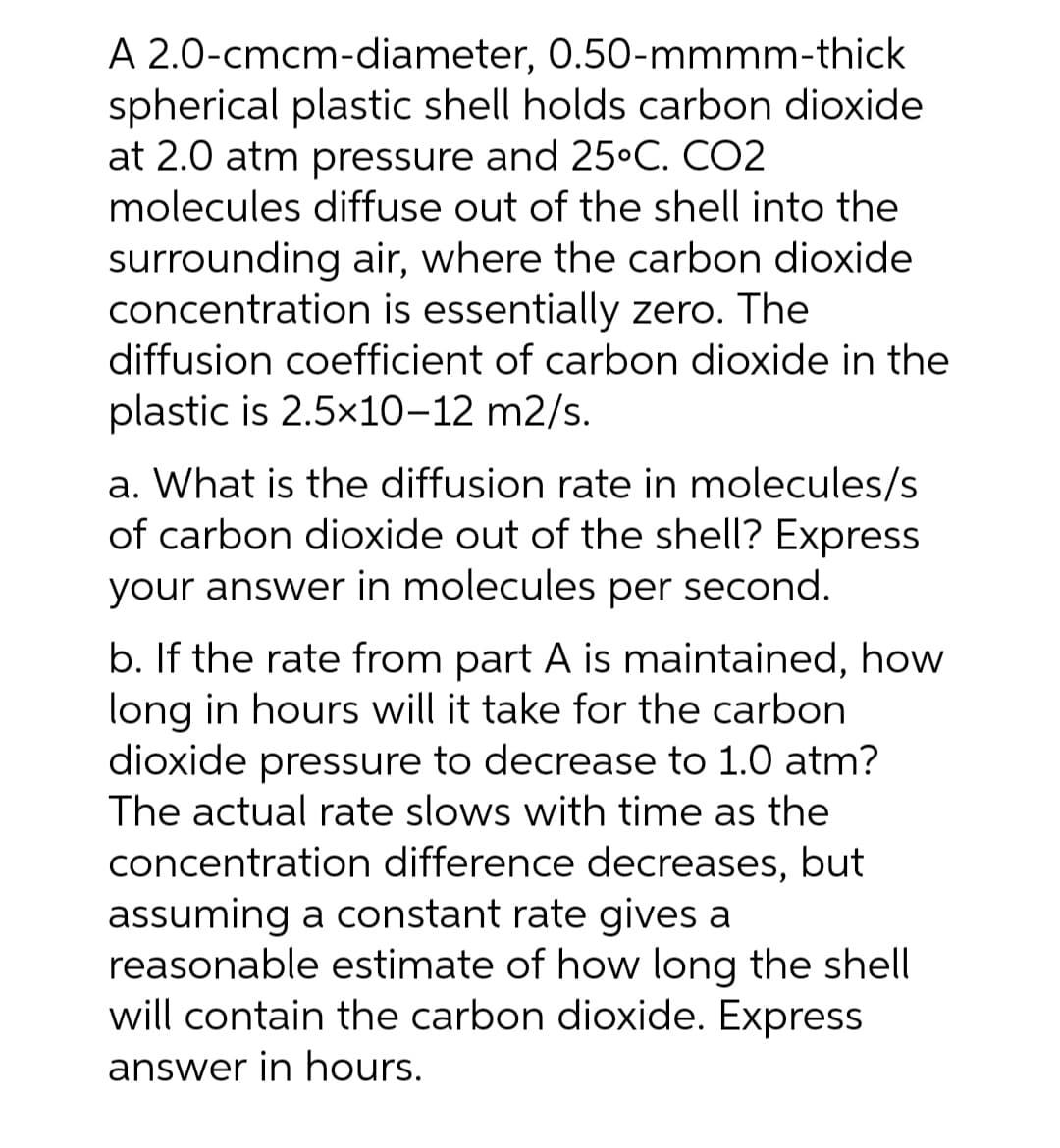A 2.0-cmcm-diameter, 0.50-mmmm-thick spherical plastic shell holds carbon dioxide at 2.0 atm pressure and 25°C. CO2 molecules diffuse out of the shell into the surrounding air, where the carbon dioxide concentration is essentially zero. The diffusion coefficient of carbon dioxide in the plastic is 2.5x10-12 m2/s. a. What is the diffusion rate in molecules/s of carbon dioxide out of the shell? Express your answer in molecules per second. b. If the rate from part A is maintained, how long in hours will it take for the carbon dioxide pressure to decrease to 1.0 atm? The actual rate slows with time as the concentration difference decreases, but assuming a constant rate gives a reasonable estimate of how long the shell will contain the carbon dioxide. Express answer in hours.
A 2.0-cmcm-diameter, 0.50-mmmm-thick spherical plastic shell holds carbon dioxide at 2.0 atm pressure and 25°C. CO2 molecules diffuse out of the shell into the surrounding air, where the carbon dioxide concentration is essentially zero. The diffusion coefficient of carbon dioxide in the plastic is 2.5x10-12 m2/s. a. What is the diffusion rate in molecules/s of carbon dioxide out of the shell? Express your answer in molecules per second. b. If the rate from part A is maintained, how long in hours will it take for the carbon dioxide pressure to decrease to 1.0 atm? The actual rate slows with time as the concentration difference decreases, but assuming a constant rate gives a reasonable estimate of how long the shell will contain the carbon dioxide. Express answer in hours.
Introduction to Chemical Engineering Thermodynamics
8th Edition
ISBN:9781259696527
Author:J.M. Smith Termodinamica en ingenieria quimica, Hendrick C Van Ness, Michael Abbott, Mark Swihart
Publisher:J.M. Smith Termodinamica en ingenieria quimica, Hendrick C Van Ness, Michael Abbott, Mark Swihart
Chapter1: Introduction
Section: Chapter Questions
Problem 1.1P
Related questions
Question

Transcribed Image Text:A 2.0-cmcm-diameter, 0.50-mmmm-thick
spherical plastic shell holds carbon dioxide
at 2.0 atm pressure and 25°C. CO2
molecules diffuse out of the shell into the
surrounding air, where the carbon dioxide
concentration is essentially zero. The
diffusion coefficient of carbon dioxide in the
plastic is 2.5x10-12 m2/s.
a. What is the diffusion rate in molecules/s
of carbon dioxide out of the shell? Express
your answer in molecules per second.
b. If the rate from part A is maintained, how
long in hours will it take for the carbon
dioxide pressure to decrease to 1.0 atm?
The actual rate slows with time as the
concentration difference decreases, but
assuming a constant rate gives a
reasonable estimate of how long the shell
will contain the carbon dioxide. Express
answer in hours.
Expert Solution
This question has been solved!
Explore an expertly crafted, step-by-step solution for a thorough understanding of key concepts.
This is a popular solution!
Trending now
This is a popular solution!
Step by step
Solved in 3 steps

Recommended textbooks for you

Introduction to Chemical Engineering Thermodynami…
Chemical Engineering
ISBN:
9781259696527
Author:
J.M. Smith Termodinamica en ingenieria quimica, Hendrick C Van Ness, Michael Abbott, Mark Swihart
Publisher:
McGraw-Hill Education

Elementary Principles of Chemical Processes, Bind…
Chemical Engineering
ISBN:
9781118431221
Author:
Richard M. Felder, Ronald W. Rousseau, Lisa G. Bullard
Publisher:
WILEY

Elements of Chemical Reaction Engineering (5th Ed…
Chemical Engineering
ISBN:
9780133887518
Author:
H. Scott Fogler
Publisher:
Prentice Hall

Introduction to Chemical Engineering Thermodynami…
Chemical Engineering
ISBN:
9781259696527
Author:
J.M. Smith Termodinamica en ingenieria quimica, Hendrick C Van Ness, Michael Abbott, Mark Swihart
Publisher:
McGraw-Hill Education

Elementary Principles of Chemical Processes, Bind…
Chemical Engineering
ISBN:
9781118431221
Author:
Richard M. Felder, Ronald W. Rousseau, Lisa G. Bullard
Publisher:
WILEY

Elements of Chemical Reaction Engineering (5th Ed…
Chemical Engineering
ISBN:
9780133887518
Author:
H. Scott Fogler
Publisher:
Prentice Hall


Industrial Plastics: Theory and Applications
Chemical Engineering
ISBN:
9781285061238
Author:
Lokensgard, Erik
Publisher:
Delmar Cengage Learning

Unit Operations of Chemical Engineering
Chemical Engineering
ISBN:
9780072848236
Author:
Warren McCabe, Julian C. Smith, Peter Harriott
Publisher:
McGraw-Hill Companies, The